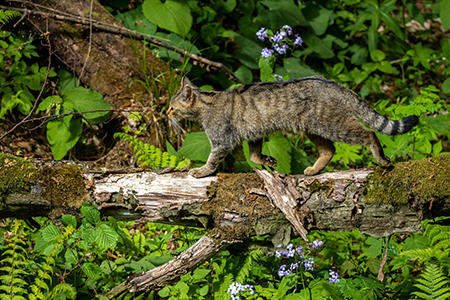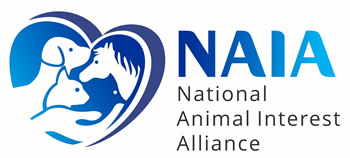
Inside This Issue:
- A Happy and Safe Fourth of July to You and Your Pets!
- New Zealand Feral Cat-Killing Contest Raises Awareness of Issue and a Lot of Hackles
- Kinkajou Found at Yakima, Washington Rest Stop
A Happy and Safe Fourth of July to You and Your Pets!
Dogs and fireworks can be a rough combination. Most dogs don’t love fireworks, though they are more than happy to stick around if there is barbeque. Some dogs, however, are utterly terrified of the sounds, sights, and smells of the Fourth of July – and these poor pups can be reduced to a trembling mess during fireworks season. They might howl, pace frantically, or even try to escape in the hopes of finding a safer place. And sometimes they do escape: the number of strays always goes up during the July 4th weekend. This is a great time to remember the importance of permanent identification for your pet!
On the flip side, and less often discussed, there are also a few overly, uh, patriotic dogs that may try to investigate or even chase after a neighborhood fireworks display as it goes off. These are definitely not the kind of chew toys you want your dog getting a hold of.
Regardless of how your dogs feel about fireworks, it’s best to keep them inside and away from the festivities, or at the very least, on leash and secure the entire time.
Here are several precautions you can take through the night to help them during the fireworks display:
- Set up a quiet, comfortable area where your dog can retreat. Include their favorite bed, toys, and some treats.
- Consider using anxiety wraps, calming collars, or pheromone diffusers designed to help soothe dogs.
- Tire your dog out with a long walk or play session earlier in the day, so they're more likely to be relaxed and sleepy.
- Your dog can pick up on your emotions, so stay calm and act normally to help them feel more at ease.
- Lastly, if your dog's anxiety is severe, consult your vet. They may recommend medication or other treatments to help manage their stress.
If you do have plans to go out on the town remember these tips to keep your dog safe:
- Make sure your dog is on a leash and has proper identification.
- Bring their favorite toys, blanket, or bed to create a familiar and comforting space.
- Grab some ear protection designed for dogs that can help muffle the sound of fireworks
- Bring plenty of water for you and your dog.
- If your dog starts showing signs of serious distress and there isn’t a safe, secure place available for them to stay in, consider leaving early. It’ll be better for your dog, the people around you, and ultimately you (you weren’t going to be able to enjoy it, anyway).
We know this is a lot of "do this" and "don't do that" to take in, but we promise it's not because we're just a bunch of wet blankets who don't want people to enjoy their holiday. It's actually the opposite: we offer advice because we want people and their pets to have a fun and safe Independence Day!
New Zealand Feral Cat-Killing Contest Raises Awareness of Issue... and a Lot of Hackles

Feral cat.
In New Zealand, a feral cat-killing contest, where prizes were handed out for categories like “most cats killed” or “largest dead cat” created quite a spectacle, and – perhaps as intended – loads of controversy. Predictably, numerous protesters showed up to the event, though they were forced to leave after children began throwing rocks at them.
As you can imagine, this is a very heated issue – and not just for the protesters. Cats pose a huge threat to New Zealand’s native wildlife, and the growing feral cat population is a problem everybody wants to solve. So we're all on the same page when it comes to agreeing that there is a problem. Where things fall apart is getting people to agree on a solution for the problem.
You have people who want to cull the cats by any means necessary – the more the merrier, and they’ll even offer prizes. Of course, their methods, gallows humor, and apparent eagerness to kill-kill-kill, is off-putting to a lot of people. Then you have folks who reluctantly agree that there needs to be a cull, but within more “humane and respectful” parameters. This is a middle path many people would no doubt be willing to go down. However, this path requires a lot more time and planning, expertise, oversight, and materials than holding “big prizes for dead cats” competitions. And highly skilled professional services (e.g. veterinarians) aren’t free: a lot of people support ideas right up until they have to open their own pocketbooks. Then, of course, are the trap-neuter-return folks, whose hearts are in the right place, and whose methods would probably be supported by the vast majority of people… provided you could prove that those methods are actually effective.
We can’t tell you what population control methods New Zealand will choose to employ in response to its feral cat issue, but we can be absolutely certain of two things. First, this won’t be an easy process, and second, there will be no end of disagreements along the way. Getting everyone on the same page is going to be a lot like, well, herding cats.
Kinkajou Found at Yakima, Washington Rest Stop

A Kinkajou in a somewhat more natural state.
A kinkajou was recently discovered hanging out – quite literally – in broad daylight, at a Yakima, Washington rest stop. What makes this remarkable, is the fact that this critter is a nocturnal rainforest dweller, with a habitat that spans from southern Mexico to South America. Yakima may be lovely this time of year, but obviously, this animal had some, ahem, “help” arriving in the U.S.
Kinkajous are legal in several states, but they are expensive to obtain from a reputable breeder, and properly caring for them requires more work and know-how than most owners possess. Further, their lifespans are long enough to outlive older or unlucky owners, and they have a "terrible two" phase that may last for years. So, while the origin of this furry rest stop visitor remains unknown, you can’t be blamed if your mind went straight to “illegal pet trade” or “pet dumping.” Fortunately for the kinkajou, Tacoma’s Point Defiance Zoo & Aquarium isn’t too far away. The zoo is currently quarantining the animal and providing it with a temporary home while officials decide how to move forward.
Also in the News...
★ Pet food recalled for danger to animals—and people (Pet Health & Safety Alerts; Recalls)
★ Hippos might fly: UK research discovers animal can get airborne (Field Research; First Hippos, Next Pigs)
★ New Jersey woman charged after several dead animals found inside freezer (Neglect; Criminal Cases)
★ Wheeling Shelter Says Sanitation Worker Saved 101 Animals During Flood (Rescues & Shelters; A Disaster With a Happy Ending)
★ From Orcas To Ducks – The Surprising Animals That Can Mimic Human Speech (Fun & Goofy Lists; Speaking of Speaking)
Click here to see what is happening legislatively


